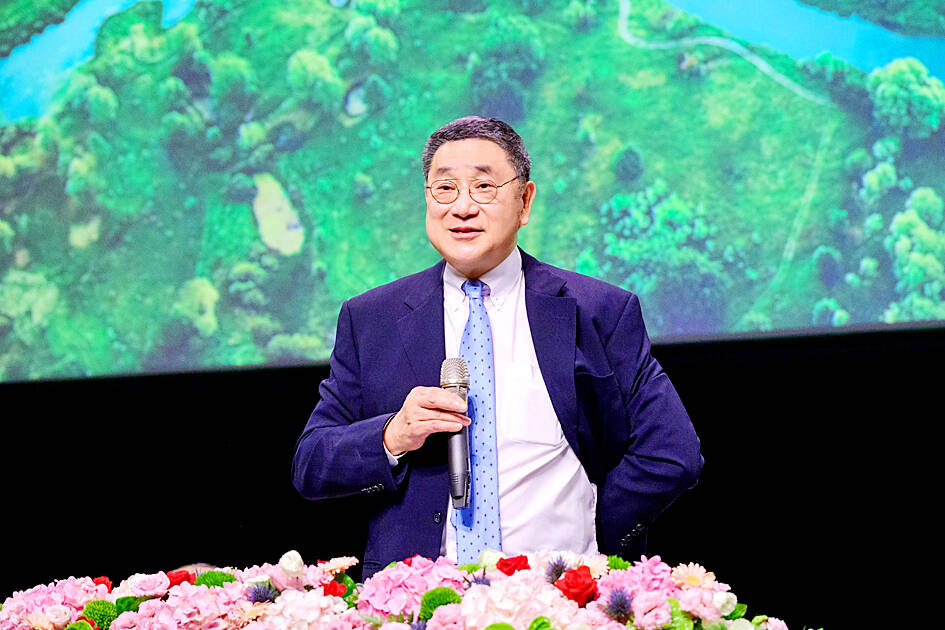Taiwan Cement Corp (台灣水泥) yesterday said that it expects cement to account for less than half of its sales by 2025, as revenue from energy storage and vehicle charging businesses pick up.
Cement production would remain the company’s core business, despite business diversification efforts, Taiwan Cement chairman Nelson Chang (張安平) said at the company’s annual shareholders’ meeting.
While the company is expanding into the green energy business in line with global efforts to curb carbon emissions, it would continue to produce up to 80 million tonnes of cement a year, Chang said.

Photo courtesy of Taiwan Cement Corp
The foray into green energy is intended to help maintain its core operations, as cement manufacturing generates considerable carbon emissions and is subject to heavy carbon taxes in different parts of the world, Chang said.
For instance, its cement facility in Portugal pays a carbon tax of US$100 per tonne, higher than the selling price of cement, he said.
As such, the company has no choice but to invest in carbon reduction ventures to stay afloat, he added.
Carbon reductions must be fast and efficient, and the use of solar and other green energy resources in producing cement is not enough to offset carbon emissions, Chang said.
That means Taiwan Cement has to press ahead and develop carbon capture techniques that would help mitigate the negative impact of cement production on the environment, he said.
Carbon reduction will be crucial for Taiwan Cement and the whole industry in the coming decades, as carbon emissions are gaining speed and causing unimaginable damage to the world, he said.
The company will continue to produce cement, because it is a basic material for all building and infrastructure projects, he said.
As cement is a social necessity, Taiwan Cement has a responsibility to help reduce carbon emissions, he added.
Chang said he has been visiting cement facilities in China every month since the nation reopened its borders late last year.
Taiwan Cement is conservative about its outlook for this year, amid global concern over curbing carbon emissions and raw material prices remaining high, albeit lower than their peak last year, officials said.
Investments in energy storage and vehicle charging would take time to make meaningful contributions to profit, they said.

When an apartment comes up for rent in Germany’s big cities, hundreds of prospective tenants often queue down the street to view it, but the acute shortage of affordable housing is getting scant attention ahead of today’s snap general election. “Housing is one of the main problems for people, but nobody talks about it, nobody takes it seriously,” said Andreas Ibel, president of Build Europe, an association representing housing developers. Migration and the sluggish economy top the list of voters’ concerns, but analysts say housing policy fails to break through as returns on investment take time to register, making the

‘SILVER LINING’: Although the news caused TSMC to fall on the local market, an analyst said that as tariffs are not set to go into effect until April, there is still time for negotiations US President Donald Trump on Tuesday said that he would likely impose tariffs on semiconductor, automobile and pharmaceutical imports of about 25 percent, with an announcement coming as soon as April 2 in a move that would represent a dramatic widening of the US leader’s trade war. “I probably will tell you that on April 2, but it’ll be in the neighborhood of 25 percent,” Trump told reporters at his Mar-a-Lago club when asked about his plan for auto tariffs. Asked about similar levies on pharmaceutical drugs and semiconductors, the president said that “it’ll be 25 percent and higher, and it’ll

CHIP BOOM: Revenue for the semiconductor industry is set to reach US$1 trillion by 2032, opening up opportunities for the chip pacakging and testing company, it said ASE Technology Holding Co (日月光投控), the world’s largest provider of outsourced semiconductor assembly and test (OSAT) services, yesterday launched a new advanced manufacturing facility in Penang, Malaysia, aiming to meet growing demand for emerging technologies such as generative artificial intelligence (AI) applications. The US$300 million facility is a critical step in expanding ASE’s global footprint, offering an alternative for customers from the US, Europe, Japan, South Korea and China to assemble and test chips outside of Taiwan amid efforts to diversify supply chains. The plant, the company’s fifth in Malaysia, is part of a strategic expansion plan that would more than triple

Taiwanese artificial intelligence (AI) server makers are expected to make major investments in Texas in May after US President Donald Trump’s first 100 days in office and amid his rising tariff threats, Taiwan Electrical and Electronic Manufacturers’ Association (TEEMA, 台灣電子電機公會) chairman Richard Lee (李詩欽) said yesterday. The association led a delegation of seven AI server manufacturers to Washington, as well as the US states of California, Texas and New Mexico, to discuss land and tax issues, as Taiwanese firms speed up their production plans in the US with many of them seeing Texas as their top option for investment, Lee said. The